新托福口语练习材料——关于批评
- 格式:doc
- 大小:51.50 KB
- 文档页数:4
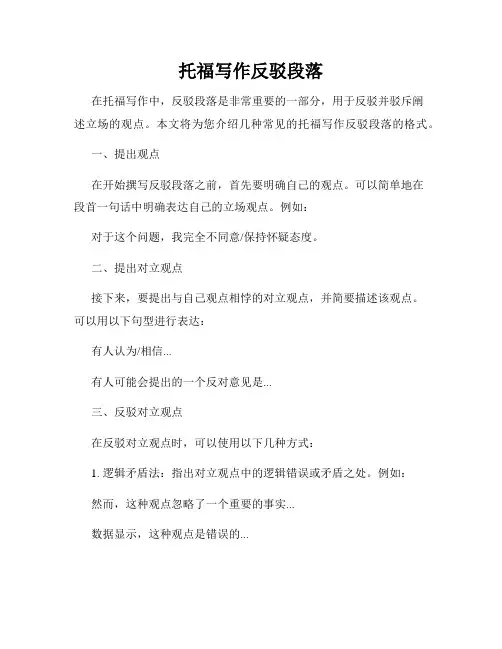
托福写作反驳段落在托福写作中,反驳段落是非常重要的一部分,用于反驳并驳斥阐述立场的观点。
本文将为您介绍几种常见的托福写作反驳段落的格式。
一、提出观点在开始撰写反驳段落之前,首先要明确自己的观点。
可以简单地在段首一句话中明确表达自己的立场观点。
例如:对于这个问题,我完全不同意/保持怀疑态度。
二、提出对立观点接下来,要提出与自己观点相悖的对立观点,并简要描述该观点。
可以用以下句型进行表达:有人认为/相信...有人可能会提出的一个反对意见是...三、反驳对立观点在反驳对立观点时,可以使用以下几种方式:1. 逻辑矛盾法:指出对立观点中的逻辑错误或矛盾之处。
例如:然而,这种观点忽略了一个重要的事实...数据显示,这种观点是错误的...2. 证据驳斥法:通过引用统计数据或可靠证据来证明对立观点的错误性。
例如:根据最新的研究,这种观点的数据是错误的...举例来说,...这揭示了这种观点的荒谬之处。
3. 比较对比法:通过与其他相关观点进行比较和对比,凸显对立观点的不合理性。
例如:相比之下,另一种观点更加合理和可信...如果我们将这种观点与实际情况进行对比,可以看出两者之间的差异...四、进一步阐述自己的观点在反驳对立观点之后,要再次强调自己的观点,并给予充分的支持和解释。
可以通过以下方式来进一步阐述:1. 引用专家意见或学术研究:通过引用专家的观点或权威研究结果来支持自己的立场。
例如:根据权威专家的研究,我可以得出结论...博士学者X在他的研究中得出了类似的结论...2. 举例说明:通过提供具体的案例或实际情况,来进一步说明自己的观点的正确性。
例如:以...为例,可以明显看出我的观点是正确的...3. 逻辑推理:通过逻辑推理和分析来支持自己的观点。
例如:基于这些原因,可以得出结论...最后,需要强调的是,托福写作反驳段落需要确保观点明晰、论证有力、语言准确。
同时,写作过程中要尽量避免使用个人感情色彩太浓的词语,以保持客观性和客观观点。
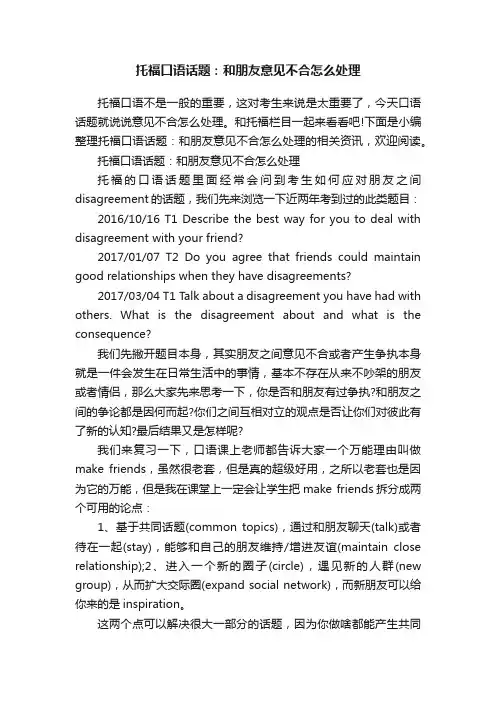
托福口语话题:和朋友意见不合怎么处理托福口语不是一般的重要,这对考生来说是太重要了,今天口语话题就说说意见不合怎么处理。
和托福栏目一起来看看吧!下面是小编整理托福口语话题:和朋友意见不合怎么处理的相关资讯,欢迎阅读。
托福口语话题:和朋友意见不合怎么处理托福的口语话题里面经常会问到考生如何应对朋友之间disagreement的话题,我们先来浏览一下近两年考到过的此类题目:2016/10/16 T1 Describe the best way for you to deal with disagreement with your friend?2017/01/07 T2 Do you agree that friends could maintain good relationships when they have disagreements?2017/03/04 T1 Talk about a disagreement you have had with others. What is the disagreement about and what is the consequence?我们先撇开题目本身,其实朋友之间意见不合或者产生争执本身就是一件会发生在日常生活中的事情,基本不存在从来不吵架的朋友或者情侣,那么大家先来思考一下,你是否和朋友有过争执?和朋友之间的争论都是因何而起?你们之间互相对立的观点是否让你们对彼此有了新的认知?最后结果又是怎样呢?我们来复习一下,口语课上老师都告诉大家一个万能理由叫做make friends,虽然很老套,但是真的超级好用,之所以老套也是因为它的万能,但是我在课堂上一定会让学生把make friends拆分成两个可用的论点:1、基于共同话题(common topics),通过和朋友聊天(talk)或者待在一起(stay),能够和自己的朋友维持/增进友谊(maintain close relationship);2、进入一个新的圈子(circle),遇见新的人群(new group),从而扩大交际圈(expand social network),而新朋友可以给你来的是inspiration。
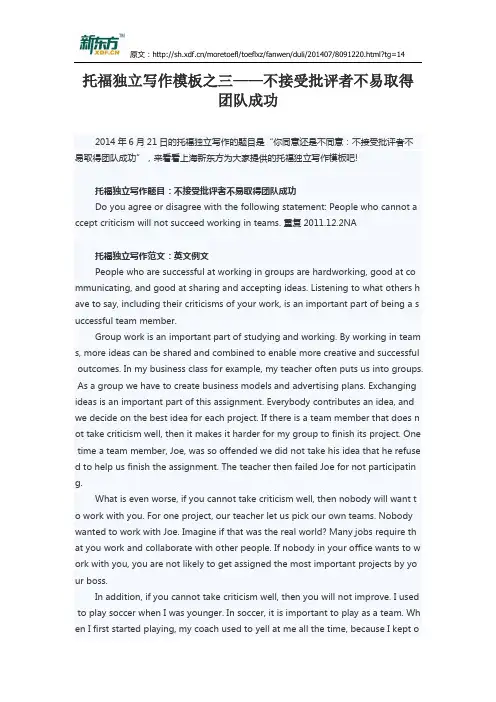
托福独立写作模板之三——不接受批评者不易取得团队成功2014年6月21日的托福独立写作的题目是“你同意还是不同意:不接受批评者不易取得团队成功”,来看看上海新东方为大家提供的托福独立写作模板吧!托福独立写作题目:不接受批评者不易取得团队成功Do you agree or disagree with the following statement: People who cannot a ccept criticism will not succeed working in teams. 重复2011.12.2NA托福独立写作范文:英文例文People who are successful at working in groups are hardworking, good at co mmunicating, and good at sharing and accepting ideas. Listening to what others h ave to say, including their criticisms of your work, is an important part of being a s uccessful team member.Group work is an important part of studying and working. By working in team s, more ideas can be shared and combined to enable more creative and successful outcomes. In my business class for example, my teacher often puts us into groups. As a group we have to create business models and advertising plans. Exchanging ideas is an important part of this assignment. Everybody contributes an idea, and we decide on the best idea for each project. If there is a team member that does n ot take criticism well, then it makes it harder for my group to finish its project. One time a team member, Joe, was so offended we did not take his idea that he refuse d to help us finish the assignment. The teacher then failed Joe for not participatin g.What is even worse, if you cannot take criticism well, then nobody will want t o work with you. For one project, our teacher let us pick our own teams. Nobody wanted to work with Joe. Imagine if that was the real world? Many jobs require th at you work and collaborate with other people. If nobody in your office wants to w ork with you, you are not likely to get assigned the most important projects by yo ur boss.In addition, if you cannot take criticism well, then you will not improve. I used to play soccer when I was younger. In soccer, it is important to play as a team. Wh en I first started playing, my coach used to yell at me all the time, because I kept on stealing the ball from my teammates. I got upset at first because I thought the c oach was just being mean. My dad then talked to me after the game, and showed me how to pass and receive the ball. If I had just quit after the coach yelled at me, I would have never improved my playing or helped my team win the school cham pionship.If you are able to listen to criticisms and negative comments, you are more lik ely to improve yourself. By improving yourself, you are more likely to find success. This is especially true if you are working with a team. Nobody wants to work with somebody who cannot exchange ideas or hear comments without getting upset. Without the support of team members, it is harder to succeed. (434 words)。
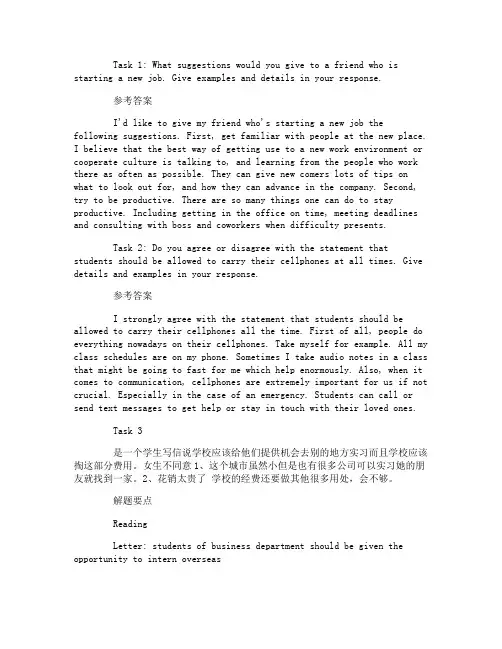
Task 1: What suggestions would you give to a friend who is starting a new job. Give examples and details in your response.参考答案I'd like to give my friend who's starting a new job thefollowing suggestions. First, get familiar with people at the new place.I believe that the best way of getting use to a new work environment or cooperate culture is talking to, and learning from the people who work there as often as possible. They can give new comers lots of tips on what to look out for, and how they can advance in the company. Second, try to be productive. There are so many things one can do to stay productive. Including getting in the office on time, meeting deadlines and consulting with boss and coworkers when difficulty presents.Task 2: Do you agree or disagree with the statement that students should be allowed to carry their cellphones at all times. Give details and examples in your response.参考答案I strongly agree with the statement that students should be allowed to carry their cellphones all the time. First of all, people do everything nowadays on their cellphones. Take myself for example. All my class schedules are on my phone. Sometimes I take audio notes in a class that might be going to fast for me which help enormously. Also, when it comes to communication, cellphones are extremely important for us if not crucial. Especially in the case of an emergency. Students can call or send text messages to get help or stay in touch with their loved ones.Task 3是一个学生写信说学校应该给他们提供机会去别的地方实习而且学校应该掏这部分费用。
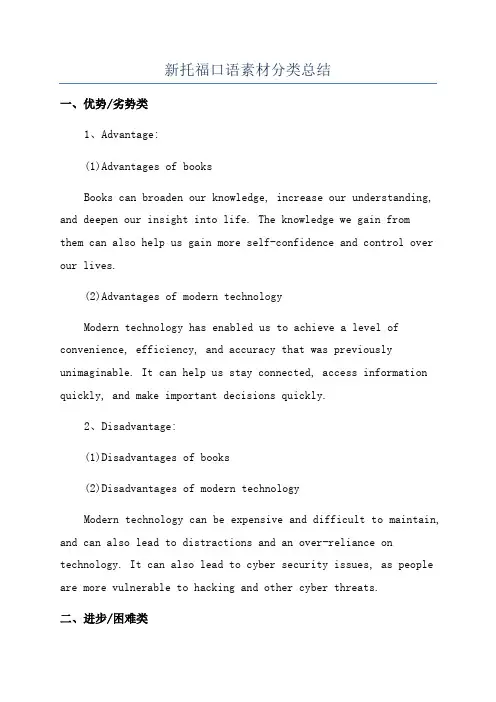
新托福口语素材分类总结一、优势/劣势类1、Advantage:(1)Advantages of booksBooks can broaden our knowledge, increase our understanding, and deepen our insight into life. The knowledge we gain fromthem can also help us gain more self-confidence and control over our lives.(2)Advantages of modern technologyModern technology has enabled us to achieve a level of convenience, efficiency, and accuracy that was previously unimaginable. It can help us stay connected, access information quickly, and make important decisions quickly.2、Disadvantage:(1)Disadvantages of books(2)Disadvantages of modern technologyModern technology can be expensive and difficult to maintain, and can also lead to distractions and an over-reliance on technology. It can also lead to cyber security issues, as people are more vulnerable to hacking and other cyber threats.二、进步/困难类1、Progress:(1)Progress in educationTechnology has made great strides in improving education, from creating online courses and virtual learning environmentsto helping teachers design engaging lesson plans. Technology has also helped students gain access to a wealth of information,from online databases to educational videos and podcasts.(2)Progress in medicineMedical technology has improved significantly over the years, from more accurate diagnostic tools to treatments that save lives. Medical advancements have also enabled us to detect and prevent diseases more quickly and accurately, improving the quality of life for many people.2、Difficulties:(1)Difficulties in educationAlthough technology has made great strides in improving education, there are still some difficulties, including the fact that not everyone has access to the same resources or technology. Additionally, students may not be familiar with the technology, which can lead to difficulties in understanding the material.(2)Difficulties in medicineThe medical field is constantly changing, so keeping up with the latest treatments and technologies can be a challenge. Additionally, the cost of medical care can be prohibitively expensive, which can make it difficult for some people to get the care they need.。
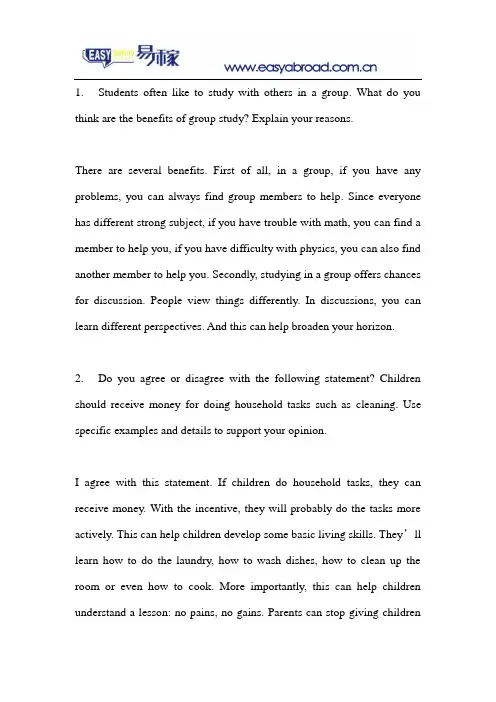
1. Students often like to study with others in a group. What do you think are the benefits of group study? Explain your reasons.There are several benefits. First of all, in a group, if you have any problems, you can always find group members to help. Since everyone has different strong subject, if you have trouble with math, you can find a member to help you, if you have difficulty with physics, you can also find another member to help you. Secondly, studying in a group offers chances for discussion. People view things differently. In discussions, you can learn different perspectives. And this can help broaden your horizon.2. Do you agree or disagree with the following statement? Children should receive money for doing household tasks such as cleaning. Use specific examples and details to support your opinion.I agree with this statement. If children do household tasks, they can receive money. With the incentive, they will probably do the tasks more actively. This can help children develop some basic living skills. They’ll learn how to do the laundry, how to wash dishes, how to clean up the room or even how to cook. More importantly, this can help children understand a lesson: no pains, no gains. Parents can stop giving childrenallowance unconditionally. Rather children should earn their allowances through their own labor. Children may even develop a sense of economy.3. The man expresses his opinion about the proposal described in the letter. Briefly summarize the proposal then state his opinion about the proposal and explain the reasons he gives for holding that opinion.The writer of the letter proposes that the university should run a free bus service between the campus and the airport during break times, because there is currently no public transportation in the line. Also, the university can use the regular buses on campus to do this service. The man in the conversation thinks this is a great idea. Firstly, he says that right now, it’s very expensive to get to the airport, since students always have to take taxi if they don’t have friends to give them a ride. It usually costs about 30 or 40 dollars. This is a big money for students. Also, he says that at the break times, there are fewer students on campus. So not many students need the bus service on campus. They don’t go to library as often.4. Explain how the example from the professor’s lecture illustrates the choice-supportive bias.Choice-supportive bias is a phenomenon that after making a choice, people tend to remember the advantages only and forget the disadvantages of the choice. The professor uses his own life experience to illustrate this. Years ago, his friend and he went to see a house. The house had a perfect location. It was near his friend’s working place. But it was a little small. His friend wanted a bigger house. Still his friend bought the house. After a few years, when the professor and his friend talked about the decision of buying this house, his friend said it was very comfortable living in this house, coz it’s close to the working place. But his friend kind of forgot that house was small and thought the house was big enough.5. Briefly summarize the problem the speakers are discussing. Then state which of the two solutions from the conversation you would recommend. Explain the reasons for your recommendation.The woman is stressed out because she has to finish 3 research papers before the end of the semester and she also has to work in an office. Her problem is that there is not enough time. There are two possible solutions. The first is that she can reduce the working hours in the office. The second is that she can get an extension on history paper. But few pointswill be taken. If I were the girl, I would choose the second solution. Working in an office is not just a part-time job; it may also become an opportunity after graduation. Since the history professor has already granted extension, she can take it. I think losing a few points is nothing compared to a future career.6. Using the examples of starthistle and Kit fox, describe two ways roads can affect the environment.The professor talks about two ways roads harmfully affect the environment. The first way is by transporting plants to new areas. The transported plants will compete with native plants for natural resources. For example, there is a kind of weed, starthistle that gets transported by tires. In the new environment, it competes with native plants for water. This makes it harder for native plants to survive. The second way is by dividing the animal habits into smaller areas. Animals in smaller areas won’t have enough food to support themselves. For example, Kit fox eats mice and squirrels. These small animals spread over large tracts of land. Now the fox’s habitat has been divided by high ways. It’s very hard for the fox to find enough food. So the number of the fox decreases.。
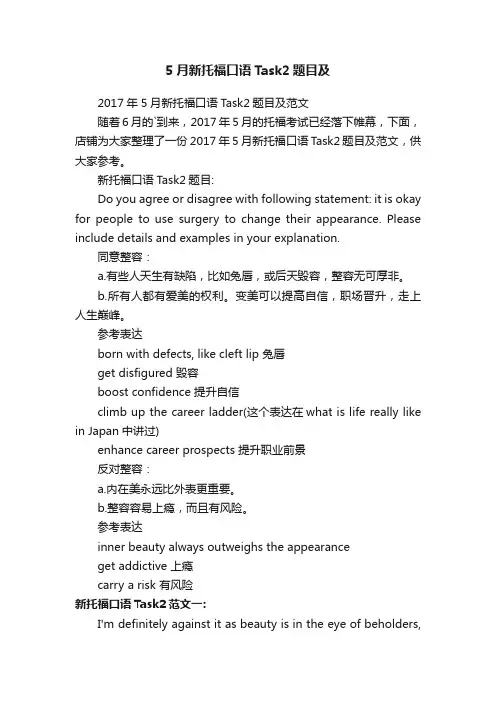
5月新托福口语Task2题目及2017年5月新托福口语Task2题目及范文随着6月的`到来,2017年5月的托福考试已经落下帷幕,下面,店铺为大家整理了一份2017年5月新托福口语Task2题目及范文,供大家参考。
新托福口语Task2题目:Do you agree or disagree with following statement: it is okay for people to use surgery to change their appearance. Please include details and examples in your explanation.同意整容:a.有些人天生有缺陷,比如兔唇,或后天毁容,整容无可厚非。
b.所有人都有爱美的权利。
变美可以提高自信,职场晋升,走上人生巅峰。
参考表达born with defects, like cleft lip 兔唇get disfigured 毁容boost confidence 提升自信climb up the career ladder(这个表达在what is life really like in Japan中讲过)enhance career prospects 提升职业前景反对整容:a.内在美永远比外表更重要。
b.整容容易上瘾,而且有风险。
参考表达inner beauty always outweighs the appearanceget addictive 上瘾carry a risk 有风险新托福口语Task2范文一:I'm definitely against it as beauty is in the eye of beholders,after all you have done to impress others, at the end you find no one appreciating and you start to think if it's worth the risk and pain all over again.Plus it makes everyone look the same, now when i go out i figure out right away who has been under knife. this unnatural look says it all!And now with all kinds of makeup techniques, people are able to look the way they want, so why suffer when things can work out just like that, most importantly its more natural!新托福口语Task2范文二:Well, personally, I think it is acceptable for people to undertake plastic surgery based on the following reasons. T o begin with, when someone is having a plastic surgeries, the money will be paid to the surgeons and also to those who work in that place, like the janitors, repairmen, cashier and the receptionists. In short, it can boast the economy by creating more jobs. Additionally, some people are not happy with their appearance, and a better body and facial appearance will help build up their confidence and they certainly have the right and freedom to decide what they do with their body. I mean, it doesn't hurt to have the plastic surgeries as long as the party involved can afford it.新托福口语Task2范文三:To be honest, I’m ok with this. Changing the way people look has become a part of their daily topics. I always hear people around me talk about having a plastic surgery in South Korea, like breast implants or double-fold eyelids. Even I want to make my chin look pointy. You may think I am crazy, but tell you the truth, if some people don’t get it done, they will lose their precious chances. For example, when two girls are taking a jobinterview. Girl A looks really normal, actually when she is surrounded by the crowd, you w on’t even notice her. And Girl B has ever done a plastic surgery on her nose, cheeks and eyebrows, and she’s perfect in most men’s eyes. So, whom do you think will get the job? Girl B of course. I’m not being judgmental, I’m just telling the cruel facts.【2017年5月新托福口语Task2题目及范文】。
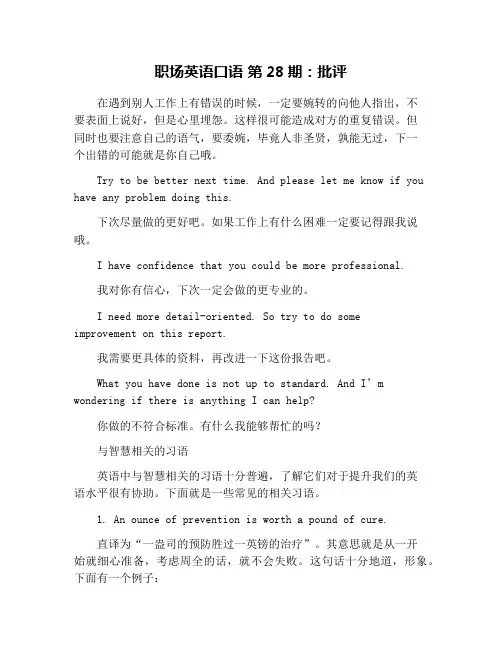
职场英语口语第28期:批评在遇到别人工作上有错误的时候,一定要婉转的向他人指出,不要表面上说好,但是心里埋怨。
这样很可能造成对方的重复错误。
但同时也要注意自己的语气,要委婉,毕竟人非圣贤,孰能无过,下一个出错的可能就是你自己哦。
Try to be better next time. And please let me know if you have any problem doing this.下次尽量做的更好吧。
如果工作上有什么困难一定要记得跟我说哦。
I have confidence that you could be more professional.我对你有信心,下次一定会做的更专业的。
I need more detail-oriented. So try to do some improvement on this report.我需要更具体的资料,再改进一下这份报告吧。
What you have done is not up to standard. And I’m wondering if there is anything I can help?你做的不符合标准。
有什么我能够帮忙的吗?与智慧相关的习语英语中与智慧相关的习语十分普遍,了解它们对于提升我们的英语水平很有协助。
下面就是一些常见的相关习语。
1. An ounce of prevention is worth a pound of cure.直译为“一盎司的预防胜过一英镑的治疗”。
其意思就是从一开始就细心准备,考虑周全的话,就不会失败。
这句话十分地道,形象。
下面有一个例子:A:Don’t you think you s hould deal with this problem now?B: I will do something about it tomorrow.A: An ounce of prevention is worth a pound of cure.2. Appearances are deceiving.这则典故出自伊索寓言中《老鼠与狮子》中的教训,告诫人们外表是欺骗人的东西。
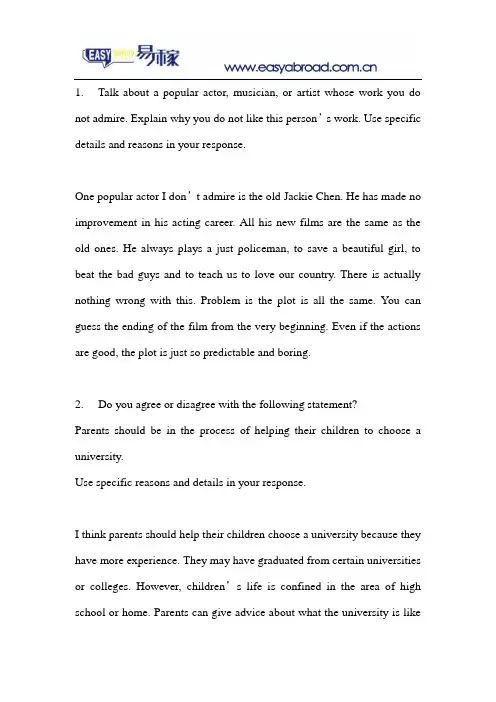
1. Talk about a popular actor, musician, or artist whose work you do not admire. Explain why you do not like this person’s work. Use specific details and reasons in your response.One popular actor I don’t admire is the old Jackie Chen. He has made no improvement in his acting career. All his new films are the same as the old ones. He always plays a just policeman, to save a beautiful girl, to beat the bad guys and to teach us to love our country. There is actually nothing wrong with this. Problem is the plot is all the same. You can guess the ending of the film from the very beginning. Even if the actions are good, the plot is just so predictable and boring.2. Do you agree or disagree with the following statement?Parents should be in the process of helping their children to choose a university.Use specific reasons and details in your response.I think parents should help their children choose a university because they have more experience. They may have graduated from certain universities or colleges. However, children’s life is confined in the area of high school or home. Parents can give advice about what the university is likeand what is it like to live alone in a big city and what is it like to live alone in a country side. In addition, they can help find information about colleges, coz there are so many out there. Children may not have enough time to do all the research.3. The woman expresses her opinion about the university’s plan. Briefly summarize the plan. Then state her opinion and explain the reasons she gives for holding that opinion.The university decides to switch from traditional-bound textbooks to electronic devices. They think this can help save student’s money. They also think the device will be an effective study aid. However, the woman in the conversation doesn’t like the idea. First of all, she thinks this is not gonna save money because students will need more than one device. If the device breaks down, they have to buy a new one. If the device comes with new features, they will also want to have the new one. Secondly, she thinks the screen is too small to handle. The keypad and buttons are small. It’s actually pretty hard to do highlighting, underlighting or even selecting. So it’s not an effective study aid.4. Explain how the example from the lecture illustrates the concept ofswarm intelligence.Swarm intelligence is a group behavior that does more complex things than does the individual behavior. The professor uses ants as an example. In the example, the ants are moving on the tree branch to find food. When they reach the end of the branch, they find out that the food is on another branch. And there is a space between the two branches. Then, an ant will go and uses its legs to hold on the end of the branch and stretches its body forward into the space. Then, another ant will hold on the end of the first ant and also stretches its body into the space. Then one after another, other ants do the same thing to form a bridge to connect the two branches. So the rest of the ants can cross the space to reach the food source.5. Briefly summarize the problem the professors are discussing. Then state which of the two solutions from the conversation you would recommend. Explain the reasons for you recommendation.The female professor is having a scheduling conflict. Her poetry class is at the exact same with her cousin’s retirement party. There are two possible solutions. The first one is to let the male professor help teach the poetry class. But the male professor hasn’t taught poetry for years. Thesecond solution is to teach the class and cover the review session herself. But she’ll be late for the retirement party. If I were the female professor, I would choose the second solution. Teaching is the responsibility of teachers while having a party is just a personal life activity. Responsibility should always come first. Plus, students are going to have an exam next week. The review session must be very important for them. The male professor cannot help cover the review session.6. Using the examples from the lecture, explain two developments that allowed ancient Roman cities to expand.The professor talks about a couple of advanced technologies Roman cities used to expand. The first technology is an advancing building material called concrete. Concrete can harden under water. Romans use this concrete to build strong bridges across wide rivers. This bridge can also transport heavy materials. So Roman cities can grow on both sides of the river. The other technology is called aqueduct. Aqueduct is a water channel that can move water from water source to the city. The flow is very steady. And tremendous water can be transported to great distances. So the Roman cities can expand without locating near rivers.。
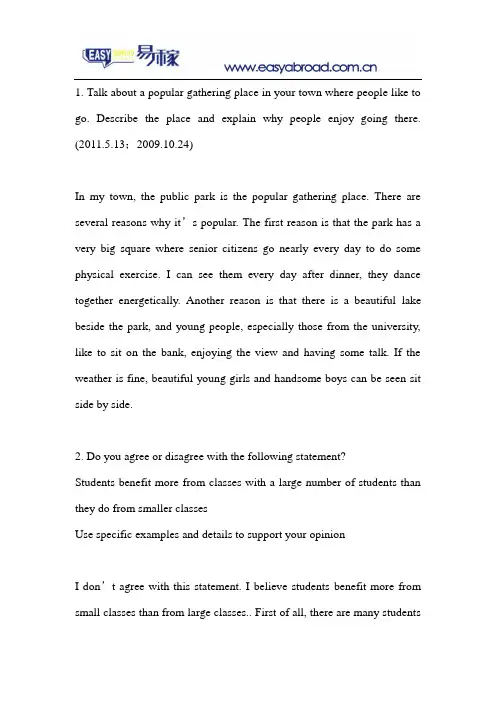
1. Talk about a popular gathering place in your town where people like to go. Describe the place and explain why people enjoy going there. (2011.5.13;2009.10.24)In my town, the public park is the popular gathering place. There are several reasons why it’s popular. The first reason is that the park has a very big square where senior citizens go nearly every day to do some physical exercise. I can see them every day after dinner, they dance together energetically. Another reason is that there is a beautiful lake beside the park, and young people, especially those from the university, like to sit on the bank, enjoying the view and having some talk. If the weather is fine, beautiful young girls and handsome boys can be seen sit side by side.2. Do you agree or disagree with the following statement?Students benefit more from classes with a large number of students than they do from smaller classesUse specific examples and details to support your opinionI don’t agree with this statement. I believe students benefit more from small classes than from large classes.. First of all, there are many studentsin a large class and it’s usually in a big lecture hall. Teachers or lecturers will always focus on their own topic. There aren’t as many interactions in it as in a small class. In small classes, students are allowed to make discussions. Also, students can get more attention from teachers and thus have more opportunities to voice themselves. Secondly, in a large class, if there is a point a student doesn’t understand, he or she might be left behind, while in a small class, teachers give attention to every student, so no one will be left behind.3. The woman expresses her opinion about the student’s proposal. State her opinion and explain the reasons she gives for holding that opinion.The student proposes to close the Campus Coffee house because students usually don’t use it and the food in the coffee house is not good. The woman in the conversation doesn’t like the proposal. She says the good thing about the Coffee House is that it’s never crowded. So it’s a great place to study. She always reads a book or works on a paper in it. She even prefers it to the library. Plus, students can eat while they study there. She also says that though the food wasn’t great, it’s a lot better now. The Coffee House has got a new manager. Last week she went there and the food was delicious. Besides, the new manager has added a lot of reallyhealthy food and snack.4. Using the example of the macaw from the lecture, explain the concept of a flagship species.A flagship species is a particular species that represents a threatened habit to the general public. The professor takes Macaw as an example to explain the concept. Macaw is a beautiful bird and has colorful features. It lives in the rain forest and relies on the trees for food and nesting. But the trees have been cut down. So macaw and a lot of other animals are in trouble. The populations of animals drastically declined. Then a group of people used macaw to represent the threatened habitat. They spread the word about how macaw needed the help and distribute books with macaw’s pictures to the school and other community places. After that, a lot of people started to take actions and contribute money to help set up a protected land, a special area where no one could cut down the tree. So, the number of macaw and other animals increase.5. Briefly summarize the problem the speakers are discussing. Then state which solution you would recommend. Explain the reasons for your recommendation.The woman just moved into a new place to live. But the problem is that the new doesn’t have an Internet connection. She has to do research and email people everyday. There are two possible solutions to this problem. The first solution is to call Internet companies to install Internet. But it’s costly, the woman has to pay for the service every month. The second solution is to use the computer center on campus. The Internet there is free. But the woman doesn’t have classes on campus every day and the computer center can get crowded sometimes. I would recommend the woman to take the first solution. Even if installing the Internet will be costly, it’s absolutely worth it. Since she has to do research and email people everyday, she must need a stable and handy Internet connection. After all, computer center is on campus and it may be crowded.6. Using the examples from the lecture, discuss two types of narrators that an author of fiction might use.The professor talks about two types of narrator in fiction. The first type is an objective narrator. An objective narrator can describe what the characters do and say. For example, if a man and woman is about to take a trip, the only information we get from the objective narrator is what thecharacters say to each other and their actions such as getting on a train and looking out the window. It forces the reader to fill in the information and to decide what the conversation might mean. The second type is an omniscient narrator. An omniscient narrator knows everything about the characters. In the example above, the omniscient narrator knows not only what they say and do, but also what they are thinking. Like, it may tell us that the man is nervous because he hasn’t seen his friend in a long time and he is worried about whether his wife will like his friend.。

智课网TOEFL备考资料托福口语经典台词:必知的粗言粗语美剧经典台词一.优雅骂人1. Stop complaining! 别发牢骚!2. You make me sick! 你真让我恶心!3. What’s wrong with you? 你怎么回事?4. You shouldn’t have done that! 你真不应该那样做!5. You’re a jerk! 你是个废物/混球!6. Don’t talk to me like that! 别那样和我说话!7. Who do you think you are? 你以为你是谁?8. What’s your problem? 你怎么回事啊?9. I hate you! 我讨厌你!10. I don’t want to see your face! 我不愿再见到你!11. You’re crazy! 你疯了!12. Are you insane/crazy/out of your mind? 你疯了吗?(美国人绝对常用!)13. Don’t bother me. 别烦我。
14. Knock it off. 少来这一套。
15. Get out of my face. 从我面前消失!16. Leave me alone. 走开。
17. Get lost.滚开!18. Take a hike! 哪儿凉快哪儿歇着去吧。
19. You piss me off. 你气死我了。
20. It’s none of your business. 关你屁事!21. What’s the meaning of this? 这是什么意思?22. How dare you! 你敢!23. Cut it out. 省省吧。
24. You stupid jerk! 你这蠢猪!25. You have a lot of nerve. 脸皮真厚。
26. I’m fed up. 我厌倦了。
托福高分范文:接受批评与成功有关托福写作题目:Do you agree or disagree with the following statement? lt is impossible tosucceed if one cannot accept criticism in teamwork.优秀范文:Good medicine tastes bitter but cures diseases and saves life, so does honest advice. Though extremely unpleasing to the ears, criticism benefits people extensively. Admittedly, nobody is perfect. Just like a powerful stimulus, honest advice urges people to be conscious of their defects and achieve self-improvement. Especially within a team, those who are unable to accept criticism can never cooperate well with others. Thus, in no way could they succeed.Above all, if a person refuses to accept criticism in teamwork, he is not in a qualified state of mind which determines the chances to succeed. A million uncertainties and obstacles may stand in the way before a person reaches the target. Therefore, the willingness to welcome any challenges should be an essential quality possessed by a potential candidate who strives to conquer difficulties on the way to success. Criticism just represents a typical challenge to be facedwith. The inability to appreciate its realvalue turns out to be a tremendous hazard that may reduce the probability of arriving at the final destination. Besides, teamwork requires all members to unite as one and be devoted to the team wholeheartedly. If one person fails to performhis assigned tasks, criticismproves to be a best cure to his problem and helps ensure smooth progression. It is nothing but a necessary approach to bringing about the most desirable result. There is no excuse for anyone to turn i t down. I once joined in a key project with several colleagues. Due to carelessness, I made some serious mistakes at the beginning. The team leader criticized me beforethe others and urged me to focus my attention. It was then I realized my own shortcomings and made up my mind to overcome them cautiously. Thanks to his criticism, I was able to do a better job and complete the project more efficiently.Furthermore, everyone should understand the fact that criticism paves the way to self-enhancement. Undeniably, the truth revealed by others is usually cruel and hard to accept, whereas the lies told by others are pleasing to the ears. In most cases, it is the truth that is included withincriticism. Just as a Chinese proverb explains, lookers-on see most of the game. Those who give criticism are actually helping people uncover the truth so that they could be clearer about their defects. Only after knowing the reality could a person develop himself in the correct direction.Last, no one is willing to work together with someone who is too stubborn to accept criticism. Thus, he is most likely to be secluded from the group. Needless to say, successful people can never do without the support and help from others. It is beyond the weak power of an individual to reach the brilliant goal totally alone.Consequently, there is no need to shun away from any good-intentionedcriticism. As a matter of fact, criticismhelps one learn about past mistakes so as to avoid future ones. It i s privileged to obtain an objective view upon oneself through others' honest advice. Thereafter, only by modestly accepting criticism could one make bigger progress and march closer to the finalsuccess.中文翻译:良药味虽苦却可治病救人,坦率的意见亦然。
1. People make friends in many different ways. What do you think is a good way to make new friends? Use specific details and examples in your response.I think attending group activity is a good way to make new friends. In a group activity, people usually have same interests and they perform some tasks together, so there’s a chance that some of the group members need to cooperate. Through cooperation, people start to know each other and then make friends. For example, I always play basketball with strangers. At the beginning, I don’t even know my teammates’names. But after a few hours' cooperation, we become friends and start to talk about each other. Sometimes, we even go to have a meal after playing. And actually, this is how I make friends.2. Do you agree or disagree with the following statement? It's important to remember and learn from the past. Use details and examples to explain your opinion.I totally agree with this statement that it’s important to remember and learn from the past. We all make mistakes and we allhave to remember mistakes. Because mistakes tell us what isn’t right. For example, when I was in the first grade primary school, I took a toy car from another student without informing him. I was too young to know that taking things from others without mentioning isn’t right. Then my teacher helped the other student find this toy car and labeled me as a thieve. I didn’t realize how serious this matter was until my father told me that this was humiliating. I swore to myself that I would never take anything from others without informing the owners. I think this is a valuable lesson and I’ll remember it forever.3. The man expresses his opinion about the proposal in the student's letter. Briefly summarize the proposal. Then state the man's opinion about the proposal and explain the reasons he gives for holding that opinion.The writer of the letter proposes that university should pave running trails to increase their safety and also make them look nicer. The man in the conversation thinks the proposal is a terrible idea. As for the thing about making trails safer, the man says the writer doesn’t think about the long-term consequencesof running on a hard surface. It’s too hard on bones and joints and can lead to injuries. So it’s actually safer to run on the soft surface. About making trails look nicer, the man doesn’t think people will like it. He says the main reason why people enjoy the trails now is that people can take a break from buildings and streets to feel the nature. If the university pave the trails, the trails will look similar to buildings and streets. Then people wont’ go there any more.4. Explain how the example from the professor's lecture illustrates the experimenter effect.Experimenter Effect is a problem that occurs when a researcher’s expectations affect the outcome of the experiment. In the example, the researcher was given two groups of monkeys. He was asked to train them to pick up a ball and put it in a box. Then he recorded how many hours it took to train each group of monkeys to learn to do so. Before experiment, the researcher was told that one group is more intelligent than the other. But actually they are all the same. What's surprising is that it took the researcher two-hour less time to train the supposedly more intelligent groupthan the supposedly less intelligent group. This is because the researcher thought one group is smarter and would be easier to train so he smiled to them, gave them encouragement and communicated with them a lot. However, the researcher wasn’t very enthusiastic about the other group, the supposedly less intelligent group. So the researcher’s expectation actually influenced the result of the research.5. Briefly summarize the problem the speakers are discussing. Then state which solution you would recommend. Explain the reasons for your recommendation.The woman is in a choir and the choir is going to have a concert in a hour. All the choir members are required to wear white shirts and black pants. But the woman spilled the spaghetti all over her white shirt and she doesn’t have time to buy another new one. There are two possible solutions. The first one is to wear another shirt that’s not exactly white. It’s a little cream color. But she won’t be looking exactly same as others and some audience may be able to tell the difference. The second solution is to borrow a shirt from her roommate. But her roommate is out of town.And the woman hates to take things without asking. Personally, I would recommend the woman to borrow the white shirt from her roommate. The woman can send a text message or voice message to her roommate to inform her. Since the concert is going to start in an hour, I think the woman’s roommate will understand heraction in this emergence.6. Using the examples in the lecture, explain how the position of bird's eyes is critical to their survival.The professor talks about how the position of bird’s eyes help them find food and avoid predators. Some birds have eyes that face forward to the skull so that they can clearly see and judge distance. They can focus on things with both eyes and accurately predict height, width and depth. For example, hawks position their eyes in the front. They have such a good eye sight that they can spot a tiny mouse in a field from high in the sky. When they spot a mouse, they will swoop down and catch it. So the placement of their eyes help them find food. Some other birds have their eyes positioned on each side of the skull in order to avoid predators. Their eyes on both sides help them watch for dangers. For example,when a duck is eating grass and insects, it is constantly looking out for danger from both sides. If a fox is approaching from either side, the duck will fly and escape. So the placement of ducks' eyes help them avoid predators.。
新托福口语练习材料(四)——关于批评Does Criticism Do More Harm Than Good to People?TextA Young Woman Who Fears ComplimentsMarya, a brilliant graduate student in her early twenties who came for consultation. Insisted that she could improve only with criticism(1). Her reasoning was that she knew the good qualities but that she did not know the bad ones. To have more knowledge of her negative qualities, she believed, would add to her self-understanding(2) and thus enable her to see herself more completely. Marya, in effect, refused to acknowledge and to understand her strengths. She had assembled detailed lists of her negative qualities which she used daily to support an extremely negative view of herself. But they were eitherexaggerated or unreal(3).Despite her attractiveness to others, she convinced herself that she was ugly. When her family bought her new and well-designed articles of clothing(she seldom bought any herself), she left them hanging in the closet for weeks before wearing them once. When someone complimented her on what she wore(4) and asked whether it was new, she could honestly answer no. She did not "deserve" to wear new clothes.She could not bear the pain of hearing compliments, of seeing herself as intelligent, pretty, orworthwhile(5).As a child, Marya had received little or no criticism from her parents. She was prized by them. Their major disappointment in her apparently was that she often rejected their overtures of kindness and appreciation, not in anger but in embarrassment, (6) as though she were undeserving. This seemingly mild-mannered young woman, (7) exceptionally courteous judgment with tenacity(8). finally, friends and interested faculty members quit acceding to her persuasive requests for criticism(9) that th ey could not honestly give. Instead, they gently but firmly confronted her with her own blindness to what she truly waslike(10).I. ListenListen to the text with the help of the following notes.1. she could improve only with criticism: 只有批评才能使她进步。
TOEFL 听说——表达赞同或反对大声勇敢地说出你的想法,同意还是反对。
这是托福听力和口语部分经常会遇到的对话。
今天凯撒国际英语的小编为大家整理出来托福中很多情况下,我们应该如表达自己的观点!相信聪明的你一定很快就掌握了!Let’s go!行。
Go ahead.May I use your phone? (可以借用你的电话吗?)Go ahead. (可以。
)随你吧。
It's up to you.You decide.可以。
Sure.Would you help me? (你能帮我吗?)Sure. (可以。
)No problem.Okay.Sure thing!Why not?I don't see why not. *直译“我没有理由说不”,see表示“明白”。
I don't see why it is not all right.That sounds okay.行啊!Let's go out drinking. (我们去喝一杯吧。
)I'm game! (行啊!)I'm all for it. (非常赞成。
)现在不行。
Not now.Could you help me? (你能帮我一下吗?)Not now. (现在不行。
)Later. (过会儿吧。
)如果方便的话……If it's all right with you,…If it's all right with you, I'd like to go to bed now. (如果方便的话,我想休息了。
)Go ahead. (您请吧。
)约翰,你可以回家了。
You may go home now, John.最好不要。
I'd rather you didn't. *I'd rather…not表示“如果可以的话,我不想……”、“如果可以的话我想拒绝……”、“如果允许的话我想推辞……”。
新托福口语练习材料——关于批评(1)Does Criticism Do More Harm Than Good to People?TextA Y oung Woman Who Fears ComplimentsMarya, a brilliant graduate student in her early twenties who came for consultation. Insisted that she could improve only with criticism(1). Her reasoning was that she knew the good qualities but that she did not know the bad ones. To have more knowledge of her negative qualities, she believed, would add to her self-understanding(2) and thus enable her to see herself more completely. Marya, in effect, refused to acknowledge and to understand her strengths. She had assembled detailed lists of her negative qualities which she used daily to support an extremely negative view of herself. But they were either exaggerated or unreal(3).Despite her attractiveness to others, she convinced herself that she was ugly. When her family bought her new and well-designed articles of clothing(she seldom bought any herself), she left them hanging in the closet for weeks before wearing them once. When someone complimented her on what she wore(4) and asked whether it was new, she could honestly answer no. She did not "deserve" to wear new clothes. She could not bear the pain of hearing compliments, of seeing herself as intelligent, pretty, or worthwhile(5).As a child, Marya had received little or no criticism from her parents. She was prized by them. Their major disappointment in her apparently was that she often rejected their overtures of kindness and appreciation, not in anger but in embarrassment, (6) as though she were undeserving. This seemingly mild-mannered young woman, (7) exceptionally courteous judgment with tenacity(8). finally, friends and interested faculty members quit acceding to her persuasive requests for criticism(9) that they could not honestly give. Instead, they gently but firmly confronted her with her own blindness to what she truly was like(10).I. ListenListen to the text with the help of the following notes.1. she could improve only with criticis m: 只有批评才能使她进步。
2. To have more knowledge of her negative qualities, ..., would add to her self-understanding:更多地知道她的短处将会增加她的自我了解。
3. they were either exaggerated or unreal: 它们或是夸张,或是根本不真实。
4. someone complimented her on what she wore: 有人称赞她所穿的衣服。
5. She could not bear the pain of hearing compliments, of seeing herself as intelligent, pretty, or worthwhile: 听到别人的赞扬之辞,看到自己是一个聪明、漂亮的有用的人来说是一种痛苦,对此她不能忍受。
6. she often rejected their overtures of kindness and appreciation, not in anger but in embarrassment: 她常常拒绝他们表示慈爱和称赞并非由于生气,而是由于难为情。
7. This seemingly mild-mannered young woman: 这位貌似温顺的年轻女性。
8. held onto her own negative self-judgment with tenacity:顽固地坚持对她自己的否定态度。
9. friends and interested faculty members quit acceding to her persuasive requests for criticism: 朋友及关心她和教师们不再答应她颇具说服力的要求批评的请求。
10. they gently but firmly confronted her with her own blindness to what she truly was like: 他们温和却又坚决地向她指出她对自己的实际情况完全视而不见。
新托福口语练习材料——关于批评(1)II.ReadRead the following passages. Underline the important viewpoints while reading.1. Unfair Criticis mStuart is a typical sixteen-year-old boy who experienced and suffered from the criticis m of an alcoholic parent it seemed to Stuart the only thing his father ever had to sa y to him was. "Y ou haven’t got a brain in your head." Stuart was a sophomore in high school. It was true he was a poor student, or what his dean called an "underachiever". Even toughs Stuart knew he was an underachiever, he would have liked to hear his father say, just once, something else when he thought home his report card other than his usual, "Y ou haven’t got a brain in your head."Stuart was determined to prove to his father he did have a rain in his head. Stuart studied very hard. Some nights it was difficult for him to concentrate on his homework because he could hear his parents bickering in the next room."Y ou forgot to pay the mortgage again. The bank is fed up.""How many times can a person smash up a car? I’m surprised they haven’t taken your license away!""If you wouldn’t drink so much..."Stuart didn’t like the bickering, and wondered if his parents might separate. He wondered, too because his father was so forgetful about paying the bills, if they might lose their ho me.He kept telling himself that if he studied hard, maybe, by some miracle, things would get better at home.Stuart’s determination to concentrate on hi s school work, in spite of the bickering and worries at home, paid off. His next report card showed a marked improvement. There was even a personal note of praise from his dean written on the report card.Proudly Stuart put the report card on his father’s desk. Stuart felt happier than he had felt in a long time. He knew that his father could only be pleased with such a report, but more important, maybe now his father would realize that he was intelligent and would start paying some attention to him. Stuart could remember when his father used to go to ballgames and movies with him. Who knew? M aybe things would go back to the way they used to be. Stuart would offer to get a part-time job to help pay off some of the bills. He thought that might lessen some of the arguing at home and keep the family from breaking up. He would let his father know t hat he was old enough to understand things weren’t always easy at the office.When Stuart’s father came home and saw the report, he said without any hesitation, "Well, well, who did the work for you? I know you don’t have the brains to do it!"St uart was stunned. All that work for nothing! He wouldn’t be surprised if his father not only thought he was stupid but hated him, too.Stuart would not have been as hurt if he had only known his father was tied up in his own miserable feelings. This kept him from recognizing what Stuart had accomplished in school.2. Uses of CriticismWhile some of us have a tendency to disbelieve or to minimize the good things people say about us, others among us have a tendency to hold a protective web aroun d ourselves in defense against criticis m. One workshop participant said, "I confuse the issue by getting logical in the face of threatening reactions. Sometimes I act helpless so others will stop the criticis m". Early in the workshop experience he had received more negative than positive reactions. While he was fearful of criticism, he found that he had courted it, hoping that he could learn how to handle it and overcome his fear.We may court negative reactions for other reasons. A therapy group member regarded criticism as more useful than compliments, and criticism is what he often got - not because he asked for it directly, but because of his detached manner, as though he were sitting in judgment of others. Moreover, his tendency to qualify and hedge his opinions and feelings until they had no meaning often brought down their displeasure stoically, as though it strengthened him. He never openly criticized other members, however.Still another member, who claimed that "criticism is the stuff that we grow on", gave others criticis m galore so they could improve and, in his words, "not appear in a negative light in the future," This member came across as using his ostensible concern for the growth of others as an excuse to criticize and attack them.3. Is It Right to Withhold One’s Reactions to Others?It is not uncommon for us to withhold our reactions to others. We may hold back compliments for fear of embarrassment to them and to ourselves. We may hold back criticism for fear of being disliked or considered unfair, or for fear of hurting another person. Reactions given inconsiderately may indeed hurt others. On the other hand, some of us are inclined to withhold our reactions from others while at the same of us are inclined to withhold our reactions from others while at the same time we honestly prefer than they not hold back theirs from us. We may have two different rules. The first one may be: If we ask others for candid reactions to our behavior, to something we have done or plan to do, we want them to tell us straight, including the negative with the positive. The second rule may be: If someone else asks us for similar reactions, we are inclined to hold back or gloss over the negative and embroider the positive.4. Criticis m Is a Kind of Demand on Those CriticizedAs children, many of us got a great deal of criticism and , as a result, learned a variety of patterns for coping with it. marya had apparently received little criticis m, butt knowing that she was not perfectand deserved what other children got, developed her own patterns of self-judgment and censure. Being judged, whether we are underestimated or overestimated, usually implies a demand, subtle or direct, that we change. If others do not demand change, we may feel the need to demand it of ourselves.Reactions that are relatively free from attempts to change or discredit us, given by someone who cares fro us, and with the intention of letting us know what impressions we are making, may be easier to take. If, however, our usual reaction is to defend ourselves, even mild criticis m or impressions given gently without demands that we change may play havoc our defensive structure and become difficult to handle.5. How to Handle Criticis mThe surgeon reached over a nd jerked the syringe out of the nurse’s hand. "Jane, that’s the sloppiest injection I’ve ever seen!" he snapped. Quickly, his fingers found the vein she had been searching for. Cheeks burning, Jane turned away. Ten years later, Jane’s V oice still trembles when she related the experience.Some of our male co-workers have it easier. They grew up encouraged to play team sports, and they had to handle a coach’s yells when they dropped the ball. Now they can see that a goof on the job is like dropping the ball in football; the fumble is embarrassing,but you take it in stride and go on.But for most women, the path to success was different. As girls, we grew up wanting to be popular; we were praised for what we were, not for what we did. So our reaction to criticis m is often, "Someone doesn’t like me. I failed to please. I’m a failure"."I get defensive," says Rhonda, a teacher, "When someone criticizes me, suddenly I’m a little girl again, being scolded, and I want to make excuses. I want to explai n that it’s not my fault -it’s someone else’s, or I want to hide and cry".6. Take a Tactful ApproachHow about giving criticis m? The old "I-want-to-be-liked" syndrome can make it as hard to give criticis m as to take it. Karen thinks she’s found th e answer."Two weeks after I was promoted to first-line supervisor," she remembers, "I had to tell a friend that she was in trouble for not turning in her weekly reports on time. My boss suggested that I tell Judy I didn’t want to fix the blame-I just wanted to fix the problem. That Judy and she offered the solution."Criticism in the workplace, whether you’re giving it or getting it, is always more effective when you focus on the task rather than on the person. Fixing the problem, not the blame, means that nobody has to feel chewed out or chewed up. We can still feel whole and learn something in the process.新托福口语练习材料——关于批评(1)III. ConsiderDoes criticis m do more harm than good to people?Arguments1. One will improve only with criticis m because generally speaking, one knows one’s good qualities better than one’s bad.2. Criticis m helps people to know their negative qualities better and will add to their self-knowledge.3. V ery often criticis m is more useful than compliments because those criticized can improve and will not make the same mistakes in the future.4. Being criticized means to be judged. Such judgment implies a change, we may feel the need to demand it of ourselves.5. Criticis m works effectively when it focuses on the task that is being done.6. One should not take a negative attitude towards criticis m, for such an attitude will keep one from knowing what others really think of one.7. In our childhood we all got a great deal of criticis m and, as a result, learning how to handle criticis m is not new to us.8. Criticis m to us is like medicine to the sick9. Only those who care for us will offer us criticis m in order to stop us from erring.10. Even though some criticis m comes from unfriendly intentions, still it can be taken as a warning.Counter-arguments1. Criticis m does more harm than good to one’s confidence and dignity2. In real life people tend to hold a protective web around themselves in defense against criticis m, for criticis m is usually very hurtful.3. Criticis m makes people lose confidence and become very negative about themselves.4. Some people of ill will use their ostensible concern for the growth of others as an excuse to criticized and attack them.5. It is not uncommon fro many sensible people to withhold their criticis m for fear of being disliked or considered unfair, or for fear of hurting another person.6. Criticis m, with few exceptions, discredits us, what we have done, or what we plan to do.7. Criticis m is authoritarian because it sets unreasonable demands on those criticized.8. Criticism should focus on the problem, if there should be any. V ery often it is the person who gets picked on.9. Criticis m throws people into frustration rather than urge them to improve.10. Frequent criticis m makes people completely baffled about how to behave and do things properly11. Criticis m is not as useful as compliments. Compliments encourage people and offer them a hopeful prospect of themselves of themselves and their lives, but criticis m does the opposite.Questions1. Do you think criticis m helps people improve? Why (why not)?2. How do you react to criticism?3. Do you criticize others often? Why (why not)? And what do you think of those who like making negative judgments about others?4. Give an example of how criticism is properly handled.IV. WriteWork out an outline of your own viewpoints. The outline should consist of major statements and supporting evidence and examples.Do you write down every word of your speech.V. Speak1. Speak according to your outline, or give spontaneous speeches when you disagree with your classmates or when you want to support your own group with similar opinions.2. Language devices: Y ou are expected to extend your ability to agree or disagree with other people’s opinions and to ask them to explain their points of view.I couldn’t agree more.That’s just what I was thinkingI take your pointI guess you could be rightY ou’re quite rightI wouldn’t go along with you there.I don’t agree at allI’m inclined to disagree with thatI am not so sure reallyWell, the point I’m trying to make is that...VI. Sum up1. The whole class decide on the best prepared speech and the best spontaneous speech2. The whole class pick out the most convincing statements from the arguments and counter-arguments.3. The teacher gives comments on students’ ideas and language.。